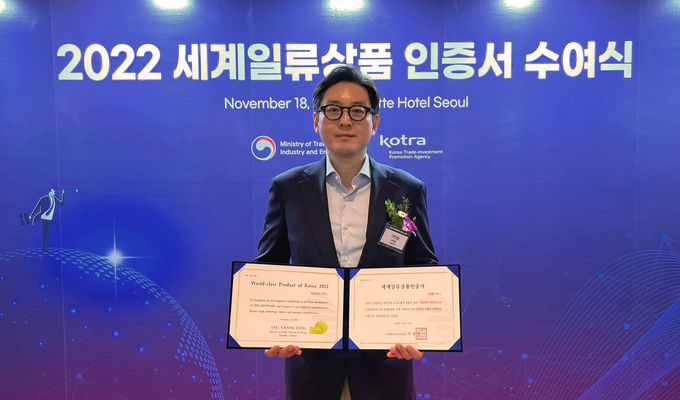Mastocheck®, a blood test for early diagnosis of breast cancer,
selected as a “2022 Next-Generation World Class Product”
by the Korean Ministry of Trade, Industry, and Energy
- Marketability and growth potential as the world’s first proteomics-based breast cancer early diagnosis blood test were recognized by the Korean Ministry of Trade, Industry and Energy’s World Class Product Development Review Committee
- Several benefits were granted; certification logo for 3 years, additional points for application in support systems such as finance and consulting operated by related ministries and government agencies, benefit from preferential interest rates and limits, discounts and so on

On the 18th, CMO In-hoi Koo of Bertis attended the “2022 World Class Product Certificate Award Ceremony” held by the Korean Ministry of Trade, Industry and Energy at LOTTE Hotel in Jung-gu, Seoul, and received a “Next-Generation World Class Product” certificate.
Proteomics-based technology and precision medicine development company Bertis (CEOs Dong-young Noh and Seung-man Han) announced on the 21st of November that Mastocheck®, a blood test for the early diagnosis of breast cancer, was selected as a “2022 Next-Generation World Class Product” certified by the Korean Ministry of Trade, Industry and Energy (hereinafter “MOTIE”).
“Next-Generation World Class Products” are selected in recognition of the possibility that the product could rank top 5 or take 5% of the global market share within the next seven years after reviewing marketability and growth potential by the World Class Product Development Review Committee held by MOTIE, and after 3 years, a qualification examination is conducted on the product annually. Selected products are given the benefits of receiving a certification logo, and for finance, consulting, and overseas marketing, additional points for applications in the support system operated by relevant ministries and government agencies such as MOTIE and the Korea Trade-Investment Promotion Agency (KOTRA), preferential interest rates and limits, and discount benefits.
Mastocheck®, which was selected as a Next-Generation World Class Product this year, was developed by Bertis and is the world’s first proteomics-based early diagnostic blood test for breast cancer. The Mastocheck® has proven effective for diagnosing stage 0 to 2 breast cancer in Korea and it was approved as an in vitro diagnostic medical device by the Korean Ministry of Food and Drug Safety in 2019. In June of this year, the test was confirmed as an advanced medical technology by the Korea National Evidence-based Healthcare Collaborating Agency (NECA), enabling out-of-pocket use in outpatient settings. Currently, Mastocheck® is available in around 170 hospitals and health examination centers in Korea.
Mastocheck® is expanding not only domestically in Korea, but also overseas. Recently, Bertis made a Mastocheck service agreement with Raffles Medical Group, the largest private medical group in Singapore, the Solis Breast Care & Surgery Center, and Innoquest Diagnostics, a medical consignment agency, and the test is being provided at more than 40 medical institutions in Singapore.
About Mastocheck® being selected this year, Bertis CMO (Chief Marketing Officer) In-hoi Koo commented, “It’s incredibly meaningful that Mastocheck® was recognized for its potential for success in the global market as an innovative diagnostic solution in the first year of its overseas expansion,” and added that, “As the proteomics leader of Asia, we, at Bertis, will work hard to expand our presence overseas so that more people can experience the usefulness of proteomics technology in disease diagnosis.”
Bertis focuses on researching and developing proteomics-based diagnostic solutions for several diseases such as pancreatic cancer, ovarian cancer, and so on, following breast cancer. Recently, the research team at Bertis presented a new multi-biomarker panel candidate with 95% accuracy for the diagnosis of stage 1 to 3 high-grade serous ovarian cancer (HGSOC), and the relevant paper was published in this year’s September issue of the Journal of Proteome Research.